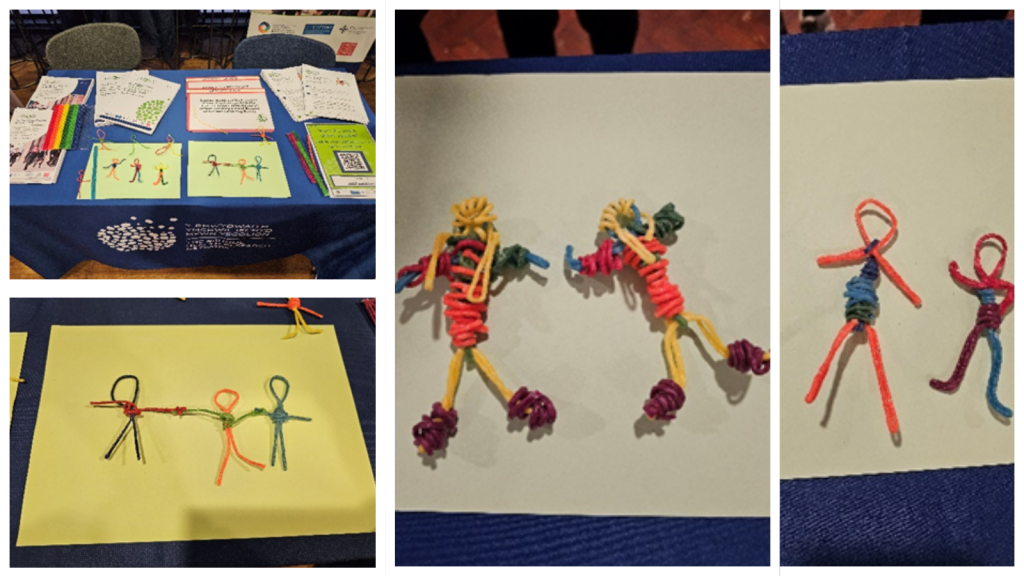
Showcasing Emotional and Mental Well-being
In support of The SHRN Student Health and Well-being Survey in Primary Schools, the SHRN team recently showcased emotional and mental well-being activities at events hosted by the WNHWPS Cardiff and Vale Healthy Team. These events provided a platform for schools to discuss their practices and explore the Welsh Government’s ‘Framework on Embedding a Whole School Approach to Emotional and Mental Well Being.’ Attendees, including Barnardo’s, Cardiff and Vale University Health Board, the NSPCC, and Public Health Wales, shared insights and experiences. Throughout the events, schools referenced the valuable data driven insights gained from their SHRN reports, using data to identify key areas for development. This SHRN data-driven approach has become a vital tool for schools in their self-evaluation of the Whole School Approach. Additionally, we engaged participants with an interactive arts-based activity focused on emotional and mental well-being.
Data Driven Insights

Throughout the event, many schools referenced the valuable insights they’ve gained from their SHRN school level report and data. By analysing their bespoke data, these schools have been able to identify key areas of development for learner health and well-being. This SHRN data-driven approach has become a vital tool for schools in their self- evaluation of the Whole School Approach.
Engaging Activities
In addition to the school presentations, we were also invited to engage participants – both learners and teachers – with an interactive activity that tied directly into the central themes of emotional and mental well-being. Wanting to offer something engaging, creative and memorable, we turned to arts-based research methods.
Creative Methods in Action
Cardiff University’s School of Social Sciences has a strong tradition of using creative and arts-based methods to help people explore and communicate complex and challenging topics. These include the experiences of looked-after children (Mannay et al. 2023), young people’s experiences on gender and sexuality (Timperley 2024), and online social and romantic relationships (Marston 2023).

When topics are hard to talk about, or have strong embodied and emotional qualities, creative activities – like making cut-up poetry, building with clay, sandboxing and painting – can help people express their feelings in a way that words sometimes can’t.
Though we weren’t conducting formal research at the event, we felt these creative methods might support children and adults attending to carefully consider their own experiences of mental and emotional well-being – and to connect the SHRN Student Health and Well-being Survey in Primary Schools to their own lived experiences and work contexts.
The Wyred Bodies Activity
Knowing we’d only have a short time to engage with the attendees, we decided to use an activity called ‘Wyred Bodies’, which was featured in the Primary AGENDA resource in collaboration with the Children’s Commissioner for Wales, NSPCC Cymru, and Welsh Women’s Aid.
This activity invites participants to create little figures using pipe cleaners, craft wire, or wax yarn, which can be shaped into different poses. Participants are then invited to ‘guess the feeling’ expressed by the poses of one another’s figures. The exercise invites participants to question whether our feelings are always visible – and when they are visible, whether our feelings might look similar to, or different from, those of other people.
A Successful Engagement
To our delight, the activity was a huge hit! By the end of the day our SHRN stand festooned with small colourful figures of different shapes, sizes and poses. The children returned to collect their creations and take them home. One learner even expressed how much she enjoyed the activity and asked her teacher if they could do it again at school!
Conclusion
Although we didn’t have much time to dive into the details of the activity with everyone who stopped by, we hoped that by discussing the SHRN Student Health and Well-being Survey in Primary Schools in such a fun and supportive setting – while making and posing the expressive little figures – encouraged attendees of all ages to consider the importance of supporting emotional and mental well-being, whilst also highlighting how emotions can be diverse and hard to fully capture in just one expression or form.

Get involved and make a difference! Read our latest blog posts to discover innovative ways to support emotional and mental well-being in schools.

About the Authors

Dr. Max R Ashton, Research Assistant
I joined the DECIPHer April 2024, as a research assistant supporting the activities of SHRN. I have a long history as a student at Cardiff University (BSc Human and Social Sciences, MSc Social Science Research Methods, PhD) which began in 2016. My academic background incorporates critical social Psychology and Education, with a specific research focus on school-based relationships and sexuality education (RSE). My PhD research incorporated diverse qualitative methods within a novel ‘post-qualitative’ theoretical approach, to explore Welsh teachers’ and pupils’ experiences of RSE provision during the rollout of the national Curriculum for Wales. My research interests include gender and sexuality, theorising complexity within organisations, and exploring the processes by which policy is translated into practice in education.
Charlotte Wooders, Engagement Manager

Charlotte is responsible for delivering knowledge exchange and engagement activities, bringing together the SHRN team, partners who use our research and wider communities to share ideas, evidence, and expertise. She also works with schools and partners across Wales, to showcase and demonstrate the impact of SHRN data, in how it creates a real and positive difference to the health and well-being of children and young people. Charlotte has previously worked in the third sector, delivering regional and national programmes and co-production initiatives to support and improve practice and policy outcomes for vulnerable children, young people, and families. She has also previously contributed to several DECIPHer and CASCADE publications and research studies, supporting stakeholder engagement and knowledge exchange activities.
